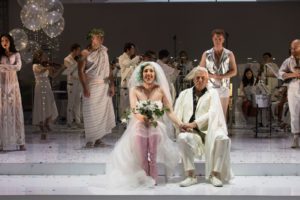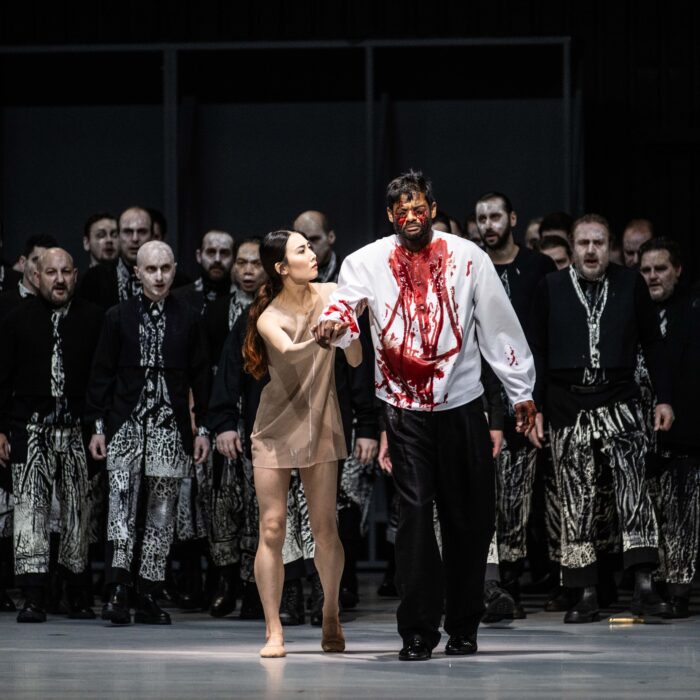
(Photo credit: Brett Boardman)
Something happens at the end of Pinchgut Opera’s “Platée” that lifts this production from brilliant to moving.
It’s a brainwave of director Neil Armfield’s that should be concealed from those who may yet see this production – the Australian premiere season of Rameau’s 1745 opera – at Sydney’s Angel Place Recital Hall or yet purchase the forthcoming digital release. Blink and you might miss it but it’s a detail that has the potential to take your breath away.
But yes, this production is a wonderful way to celebrate Pinchgut Opera’s 20th year.
Pinchgut, a specialist baroque opera company, is one of Australia’s artistic treasures. It became the first Australian company to win an International Opera Award when it was accorded best “Rediscovered Work” for Hasse’s 1740 “Artaserse” in 2019. OperaWire spoke to Pinchgut’s Artistic Director, Erin Helyard, at that time. This is the first time that OperaWire has covered a live Pinchgut production.
It’s All a Joke
“Platée” was written by French composer, Jean-Philippe Rameau, to mark the marriage of the Dauphin Louis to Maria Theresia of Spain. With it, Rameau invented a new genre, the comédie-lyrique. But, to 21st century tastes, it’s a cruel sort of comedy. The story of an ugly, ungainly nymph, denizen of a froggy marsh, pursued by Jupiter, king of the gods in order to teach his wife, Juno, a lesson about jealousy – how on earth could Juno ever think Jupiter would have been interested in Platée? – seems tactless, to say the least. Maria Theresia, apparently, was no beauty, and could so easily have been considered the butt of the joke as the original opera ends with unsparing mockery of Platée. How did Rameau and his librettists, Autreau and d’Orville, get away with it? But the framing device in the original is an entertainment by Thespis founder of comedy (supposedly) while recovering from a drunken sleep and this has the potential to soften the nastiness of the humor: it’s all a joke, anyway.
In this production, the audience arrived in the hall to find the debris of a drunken wedding reception – empty bottles strewn around the stage, hungover wedding guests dressed in designer Stephen Curtis’s summery whites flaked out on the floor, singers (wedding guests coming-to) assigned their roles (bass-baritone Adrian Tamburini – Cithéron; tenor Nicholas Jones will be Mercury…) in the forthcoming entertainment with Post-It notes stuck to their foreheads. L’Amour (soprano Cathy-Di Zhang) opens a pack of Red Bull, passes the cans around, and it’s as if the energy drink spurs everyone on for the next exhilarating 2 ¾ hours.
If you haven’t seen the production, this may sound a tad too Australian – but there is no doubt that we are listening to the most-beautifully prepared baroque opera (joyously-prepared too, judging from the rehearsal photographs published on the company’s website). And despite the cruelty inherent in the 18th century original, there is genuine humor here onstage and in the video work that opens up the performing space to include backstage areas and even projects for us all to see Jupiter’s baiting of Platée with face swaps on his mobile – a 21st century solution to the 18th century creators’ demands that Jupiter turn himself into an ass and an owl to befuddle poor Platée. The video designer was Sean Bacon.
Raising the Temperature
From the musical point of view, the most varied, buoyant, tastefully delineated, detailed playing emerges behind the vocalists – from the Orchestra of the Antipodes, Pinchgut’s official ensemble, who are onstage with the wedding guests. Overall, the effect of having everyone onstage raises the temperature. It becomes a compelling ensemble theater. Movement Director Shannon Burns ensures that the fluid onstage movement of the singers (both soloists and chamber choir Cantillation) matches their vocal agility.
Helyard shapes Rameau’s endlessly inventive, gesturally-prolific score into a fulfilling whole. Standing throughout while conducting or leaning over the keyboard playing continuo he demonstrates immense but cheerful performance-stamina, no doubt buoyed by Rameau’s constantly effervescent score. Indeed, the orchestra itself stands throughout the show, ever-alert. The principal action takes places downstage and has our main attention, but we can see as well as hear music’s conjuring of the overall effect.
The all-Australian cast was superb, from Chloe Lankshear’s Clarine and Amy Moore’s Thalie to David Greco as Momus. Standouts included the way bass Adrian Tamburini’s physical energy matched his vocal energy; the ringing clarity of tenor Nicholas Jones’s diction as Thespis and Mercury, so elegant in his number “Charmant Bacchus;” the vengeful fury of Cheryl Barker garnering appreciative laughs as she appeared furiously indignant in the recital hall balcony thinking she’s caught her errant husband in the act; the imperturbable gravitas of baritone Peter Coleman-Wright as Jupiter. There is understated humor in the way even Coleman-Wright’s eyes betray skepticism at this charade and the, er, “Delightful object of my most worthy passions” whom Mercury and Cithéron have set him up with (the translation printed in the program booklet is by Natalie Shea). And the camaraderie among the whole performing group – evident also in YouTube promotions and rehearsal-room shots on the company’s website and program booklet – was palpable.
In his director’s note, Neil Armfield says that “You do not attempt this work unless you have a performer who can meet [Platée, the title role’s] challenge: Kanen Breen is the reason we are doing ‘Platée.’” A cabaret performer as well as operatic tenor, Kanen Breen made the travesty role poignant, pitiful, overbearing, over-the-top, and often, hilarious. There is a command of almost contemporary extremes of vocal devices as he exaggerates the nasality of the French “on” (even inappropriately it seems on words like “présence”) or the outlandish falsetto of “adorable amant” when Jupiter teasingly conceals himself from poor deluded Platée in a cloud (white party balloons held by the chorus, in this production). Breen brings to life all the gaucheness and miscalculation Rameau sought to depict in this socially-awkward character. But his Platée attains a human sympathy in the final spat with Cithéron (“I blame you for this insult.” “Me?” “Yes, you” – que moi; Oui, toi). How many of us would not understand her vicious resentfulness? Who would not feel the injured party’s distress? It could be said that Platée is the only character to actually retain her decency – almost.
But a huge weight falls also on La Folie (Madness), the role assigned to soprano L’Amour at the wedding recovery part, and here Cathy-Di Zhang playing L’Amour playing Madness is formidable. “J’attriste l’allégresse même” she sings when warning what happened to Daphne when she rejected Apollo’s love – I can turn joy into sadness, she advises and that warning is totally, chillingly believable! Nor was Di-Zhang’s vocal armory exhausted yet. And we know she can also turn sorrow back. There may be more than vocal virtuosity to ally Madness/Amour (Di-Zhang) with Platée (Breen).
Director Neil Armfield was delighted when Erin Helyard asked him to work with Pinchgut for the first time. “I agreed,” he says in his director’s note, “partly because I love Pinchgut…but mostly because I knew the work would take me so far out of my comfort zone that it must be good for me.” Armfield is one of Australia’s most interesting directors and wouldn’t even balk at bringing tons of red soil or campfires into a workshop shed at the Eveleigh Railway yards to depict Central Australia in “Dead Heart” earlier in his career.
Here, his fresh take sees something in Rameau’s telling that subverts the cruelty inherent in the surface action. Is this a director’s imposition? But apparently, there’s a clue in the text. Perhaps it is the moment when Momus, god of mockery (baritone David Greco in a scary clown wig) pretends to be Love and is seemingly “corrected” for this parody. Why else is that diversion there?
So, keep an eye on Cathy-Di Zhang in those last few minutes. Don’t glance away (as I almost did), not even to check the libretto which Pinchgut generously provided in the program booklet. You’ll miss what could be considered a masterstroke.


